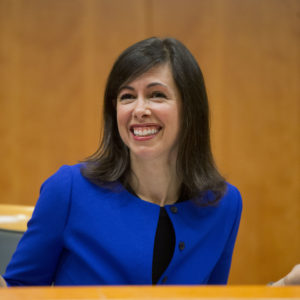The number of Trump administration agenda items that have escaped the specter of Russia is shrinking. During a congressional hearing Wednesday, Federal Communications Commission appointees seeking Senate approval were questioned about more than 300,000 fake comments from Russia meant to influence the Trump administration’s plan to repeal net neutrality rules.
Those 325,528 comments originating from one Russian address came up during the Senate confirmation hearing of three Trump appointees to the FCC, including the reconfirmation of Trump’s pick to lead the agency, Republican Ajit Pai. Pai voted against the Obama-era rules in 2015 and proposed a plan to repeal significant portions of them earlier this year.
Senator John Thune, chair of the Senate Commerce, Science and Transportation Committee, said 1.3 million comments came from international filers “with more than 300,000 coming from the same address in Russia in support of the 2015 Title II rules.”
“And there have been many other stories of fake or abusive comments being filed,” the South Dakota Republican said.
Ranking Democrat Sen. Bill Nelson of Florida agreed with a comment alluding to the Trump administration’s alleged ties to Russia during the 2016 presidential campaign.
“Isn’t it interesting we have to be concerned about comments being filed from Russia?” Nelson asked Thune. “It’s a new day.”
Pai expressed confidence the agency wouldn’t be swayed by illegitimate comments, and instead explained the FCC would ultimately be guided by standards set down in the Administrative Procedure Act. The law requires agencies adopt rules based not on the number of comments filed for or against a proposal, but on the factual and legal reasoning within.
“I do understand there have been concerns on all sides about the veracity of some of these comments,” the FCC chairman replied. “We’re ultimately guided by the substantial evidence test . . . has the agency collected evidence that a reasonable person would agree would be adequate to support whatever conclusions were ultimately made?”
The comments from Russia were uncovered along with another 300,000-plus from Germany, more than 100,000 from France, and almost 477,000 from the U.S. “but entered into the system as ‘international filer,'” data gathered on comments submitted to the agency from July 3 to July 12 indicates.
According to the National Legal and Policy Center (NLPC), the right-leaning non-profit that reported the comments, thousands of the comments “appear to come from fake email addresses and fake physical addresses overseas” and “came almost exclusively from the email domains Pornhub.com and Hurra.de (Germany).”
“At this point, the deception appears to be so massive that the comment process has been rendered unmanageable and meaningless,” NLPC President Peter Flaherty said. “More ominously, with hundreds of thousands of comments appearing to come from Russia, we must ask ourselves whether once again, Russian interests are attempting to sow chaos in U.S. official policymaking proceedings.”
Wednesday’s hearing wasn’t the first time fake comments came up in Congress. House Democrats asked federal investigators to look into a slough of fake comments submitted in support of the Trump administration’s plan to scale back the rules, some using real names and addresses of people who did not file comments.
Activists on both sides of the debate point to hundreds of thousands of fake comments against their positions. Congressional Democrats even question the FCC’s own transparency with regard to a cyberattack that crashed the agency’s online comment filing system. The crash followed a “Last Week Tonight with John Oliver” segment opposing Pai’s plan in May.
Despite the allegations of fraudulent comments, FCC General Counsel Brendan Carr, Trump’s nominee to fill the open Republican seat on the commission and a former advisor in Pai’s office, said comments still have weight.
“I think it’s very important,” Carr said. “I think it shows the level of interest and the passion in this issue, and that’s something we need to be taking into account.”
Former FCC Commissioner Jessica Rosenworcel was also on hand to answer questions in hopes of being confirmed to fill the Democratic seat she was forced to vacate in December. At the time, Republicans declined to reconfirm her appointment, preferring instead to give incoming President Donald Trump the choice to nominate her. He did so in June.
Rosenworcel didn’t shy from taking up her past positions. She expressed support for net neutrality and disagreed with Pai on issues like maintaining funding for the FCC’s E-Rate program, which helps schools and libraries pay for high-speed broadband, as well as supporting FCC regulation of cybersecurity practices.

